MercoPress. South Atlantic News Agency
Tag: Mauricio Macri
-
Tuesday, July 24th 2018 - 05:23 UTC
Argentine military will be involved in domestic security issues, announces Macri
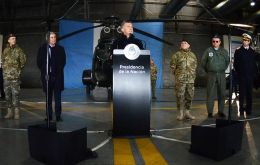
In a radical reform of Argentina's defense doctrine, President Mauricio Macri said on Monday he is removing a ban on military involvement in fighting crime, terrorist threats and other internal security issues. Macri said he will modify a 2006 decree that limited the armed forces to defense against attacks by another country.
-
Monday, July 23rd 2018 - 07:15 UTC
Top grades for Macri and his reform policies from IMF's Lagarde

Christine Lagarde, Managing Director of the International Monetary Fund, met with Argentina’s President Mauricio Macri, Finance Minister Nicolas Dujovne and Central Bank Governor Luis Caputo in the context of the Group of 20 Finance Ministers and Central Bank Governors meeting in Buenos Aires over the weekend.
-
Monday, July 23rd 2018 - 05:58 UTC
Hammond in Argentina iterates Falklands self determination and calls on Macri to address inflation and labor reform

The UK Government position is unchanged: only the Falkland Islanders have the right to determine their own political and economic future, stated Phillip Hammond in Buenos Aires where he attended a two-day G20 ministers meeting.
-
Friday, July 20th 2018 - 07:21 UTC
Argentina finances improving: half year primary deficit drops to 0.8% of GDP

Argentina posted a primary fiscal deficit of 105.8 billion pesos (US$3.7 billion), or 0.8% of gross domestic product (GDP) in the first half of 2018, government data showed on Thursday, down 26.7% from the same period last year.
-
Thursday, July 19th 2018 - 07:44 UTC
Macri offers optimistic forecast of Argentine economy, pledging growth will return next year
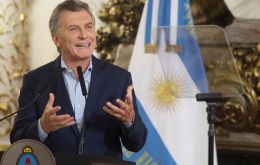
Argentina’s economy will return to growth in 2019, President Mauricio Macri said on Wednesday, following a year marked by higher-than-expected inflation and a run on the Peso currency that many economists anticipate will lead to a recession.
-
Wednesday, July 18th 2018 - 07:38 UTC
Argentina consumer prices rose 3.7% in June and reach 29.5% in twelve months

Consumer prices rose 3.7% in June in Argentina, official data showed on Tuesday. That brought 12-month inflation to 29.5%, up from 26.3% in the 12 months through May, the INDEC national statistics bureau announced, which makes it the highest monthly recorded figure of the last two years.
-
Monday, July 16th 2018 - 08:44 UTC
Argentina's debt expected to peak at 65% of GDP by end of 2018
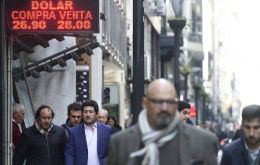
The International Monetary Fund (IMF) expects Argentina’s government debt to peak by the end of 2018 and then fall as the country cuts its deficit as part of its US$50 billion deal with the Fund, according to a document published.
-
Friday, July 13th 2018 - 05:52 UTC
Argentina: Macri grants a 20% salary increase to the Armed Forces
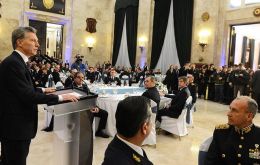
In an effort to fix a persistent deterioration of relations, the President ordered a 20% rise in the salaries of the Armed Forces. It was a political decision against the fiscal austerity measures that the government promised the IMF to deserve a financial rescue of 50,000 million dollars, but necessary to calm what already threatened to become a serious storm.
-
Tuesday, July 10th 2018 - 07:41 UTC
Macri admits mistakes and calls for support from governors, unions and business leaders

President Mauricio Macri, First Lady Juliana Awada and members of his cabinet attended on Monday, 9 July, the Argentine Independence Day celebrations in the Tucuman Historic House, where 202 years ago the emerging nation cut all ties as a Spanish colony.
-
Monday, July 9th 2018 - 07:43 UTC
Argentina's austere Independence Day celebration in Tucuman, with no military parade
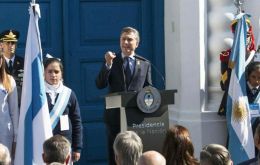
President Mauricio Macri and his cabinet will be celebrating Argentina's Independence Day, Monday 9 July at the Historic House in the northern province of Tucuman, where the declaration was first announced 202 years ago. Contrary to other years there will be no military parade in Tucuman or Buenos Aires, allegedly as a consequence of the strict austerity measures imposed by the Macri administration.
